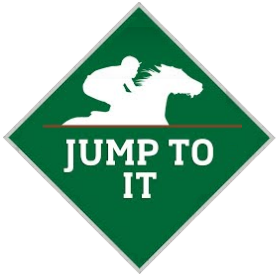
Vincent Finegan
Buyer beware
 The final hurdle was omitted at Down Royal on Friday due to low lying sun
The final hurdle was omitted at Down Royal on Friday due to low lying sun
© Photo Healy Racing
On more than one occasion in this blog I have expressed my view that Claiming races should not be part of the mainstream horse racing schedule. It is not fair that punters are presented with these races and expected to decipher them in the same way as any other contest. Time and again we see that you cannot rely on prior form or the official ratings of the contenders as these tend to bear little resemblance to the outcomes.
The core problem with Claimers is that many, but not all, of the runners have underlying issues which preclude them from achieving a level of performance close to their current official rating. The most common reason for this is that when a horse’s ability to perform is on the wane it tends to decline at a much faster rate than is reflected by its handicap rating.
Because of this it becomes a complete guessing game from a betting perspective unless you are privy to insider knowledge.
While Claimers present a minefield for punters it turns out that they can be even more treacherous for those looking to claim one of the horses.
Last Wednesday the opening race at Bellewstown was a Claiming Hurdle race and following its conclusion three successful claims were made for horses that ran in the race.
One of those horses was Boom Boom Boom, which was detached from halfway in the race and was well behind when pulled up before jumping the third last flight of hurdles. He was claimed for €6,000.
Unfortunately Boom Boom Boom didn’t make it home to his new yard after the Bellewstown race and had to be euthanized at a veterinary practice later the same day.
Despite the sad passing of Boom Boom Boom shortly after pulling up at Bellewstown the sale remains valid as the regulations governing Claiming races state: “Title to the claimed Horse shall be vested immediately in the successful claimant and the claimant then becomes the legal owner of the Horse regardless of the result of any test that may have been taken in accordance with Rule 18 or the physical condition of the Horse.”
Hard to believe you can buy a horse that passes away within hours of the purchase and you have no comeback, but that is the chance you take with Claiming Races.
Changing the subject, many of the movers and shakers of global horse racing were in attendance at the 40th Asian Racing Conference held last week. Those in attendance included our own Suzanne Eade, CEO of Horse Racing Ireland (HRI).
In the opening speech of the conference its chairman and CEO of the Hong Kong Jockey Club, Winfried Engelbrecht-Bresges, identified four key issues horse racing must overcome if the sport is to realise its full potential.
He said: “The first aspect is industry fragmentation, the second is social acceptability, third is the growth of illegal and offshore betting, and number four is the long-term sustainability of our sport, which is at risk due to an ageing customer base.”
“We have to evolve globally. There are differing priorities locally, but we have to think globally, and especially when it comes to having the necessary protections to keep our social licence - there is definitely a challenge of how we as an industry are viewed widely by people who are not in racing.”
Even within Ireland the sport is often hamstrung by individual interests resisting change that is meant for the greater good. Status quo is the default position of many of the lobby groups representing the different sectors and individuals of influence connected to the industry. Dwindling audiences and the persistent erosion of the sport’s social licence will continue to be largely ignored as long as the money keeps flowing.
That money is primarily coming from Government support, but the sport is increasingly reliant on gambling related revenues which could certainly come under threat if the “growth of illegal and offshore betting” that they are seeing in Hong Kong is replicated here.
I’m not sure how much of an issue it is here currently as I personally don’t know a single punter that is betting with illegal bookmakers. Even the tradition of illegal bookies taking bets in pubs has long since been replaced with high street operators running affiliate partnerships with publicans. My local watering hole has BoyleSports dockets and pens on the counter and the same firm’s latest odds displayed on a large screen on the wall.
We may not yet be in sync with Hong Kong when it comes to illegal bookies, but it is enlightening that the issue of an “ageing customer base” is a shared problem for both jurisdictions.
Climate change didn’t make it on to Engelbrecht-Bresges’ list, nor was it included in the threats to the industry highlighted in HRI’s recent five-year plan, which is either encouraging or disappointing depending on your point of view.
Whatever the overall prognosis for the planet is in terms of climate, low-lying sun continues to play havoc with jumping fixtures. Both Down Royal and Wexford had obstacles omitted from races on Friday evening in the interests of safety and no doubt the upcoming winter months will be plagued with the same problem.
It is very unsatisfactory for all concerned when obstacles have to be omitted, but particularly so, when it is the final hurdle or fence that is taken out. It can ruin a race.
Obviously the hurdles or fences cannot be relocated at short notice, but, in theory at least, the start and finish of the race could be altered to place the winning post in a position on the course where it was a furlong or so after an obstacle in use. We could then get a more satisfactory conclusion to the race where the final obstacle is jumped at full racing pace rather than seeing a four furlong run-in weaving around dolled off obstacles.

 Watch
Watch









